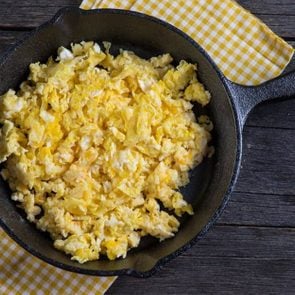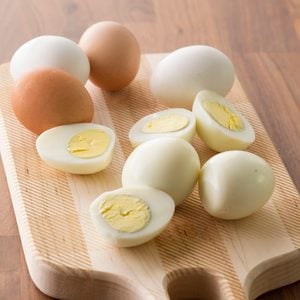This Is Why Brown Eggs Are More Expensive Than White Eggs
Updated: Dec. 05, 2023

Don't judge an egg by its shell color.
A few things we know about eggs: they are great for breakfast, you can cook them tons of different ways, and they can sometimes be tricky to crack. One topic of debate, however, is why brown chicken eggs usually cost more than white ones. Find out the difference between brown and white eggs. According to Sharman Hickman, the director of community outreach and education for Hickman’s Family Farms, it’s first important to know why chickens have various egg colors. Genetics—not nutrition—determine the eggshell color and thus their price, Hickman explains. Don’t toss the eggshell into the garbage bin. Learn how you can use eggshells for plants.
The chicken breed and their genetics decide whether or not hens possess pigment genes, the natural chemical during the egg laying process that coats the egg and results in a colored shell, says Jesse LaFlamme, CEO of Pete and Gerry’s Organic Eggs. Although all eggs start out white in color, shell color can range from white to brown and even blue in some rare breeds, Hickman adds. An interesting trick to know what color egg a specific breed of hen lays is to look at the color of their ear feathers, LaFlamme says. Breeds such as the Leghorn chicken lay white eggs while Orpington’s lay brown eggs, and Ameraucana produce blue eggs. No matter the color of your eggs, here’s why you should never store them in the refrigerator door.
Hickman notes that the Leghorn breed is the most efficient egg-laying hen, making it’s a popular choice for farmers. Hens who produce colored eggshells, however, tend to be larger and require more feed and energy to create that painted layer. Since those breeds cost more to feed, their eggs are more expensive.
Although eggs sometimes look and are priced differently, it’s impossible to know their nutritional makeup on shell color alone, according to Malina Linkas Malkani, MS, RD, CDN, media spokesperson for the Academy of Nutrition and Dietetics. “Choosing between brown and white eggs is a matter of personal preference,” she says. “But it’s important for people to know that the color of the eggshell is related to the breed of the hen, not the egg’s nutrient content, flavor profile, quality, or shell thickness.” What does affect the nutrient content is the specific diet the hen is on, according to Malkani, creator of the Wholitarian™Lifestyle. For example, hens fed a diet fortified with omega-3s and vitamin D produce eggs that are higher in those specific nutrients. No matter your preference, don’t judge an egg by its shell color. Before you start cooking, use this easy trick to see if your eggs are still good.


